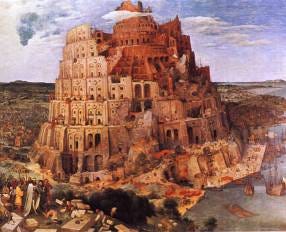The theme of the posts at this site has been that we live in a time defined by physical boundaries — the rising temperature of the planet, the slow erosion of fertile soils, the limits of fossil fuels, the destruction of the biosphere. These limits are tangible and measurable; as such, they form the foundation of much of my work on Faith in a Changing Climate.
But not all limits are physical.
Some are cognitive, spiritual, or moral. One of the most pressing of these non-physical boundaries is artificial intelligence (AI) — a development that is reshaping how we think, relate, and believe. While climate change threatens the body of our world, AI may be challenging its mind and soul.
Our Tower of Babel
In the book of Genesis, humanity tries to build a tower reaching into the heavens; it is a structure of pride and control, a symbol of human overreach. The Tower of Babel wasn’t just a skyscraper; it was a theological statement. In response, God confusion of language and disperses the builders of the tower.
Today’s AI is another tower. We are building machines to do what only humans once could: compose symphonies, interpret laws, write prayers, offer counsel, and preach sermons. But at what cost?
AI and the Church
The institutional church — particularly traditions like the Episcopal Church — now faces choices it never imagined:
Should pastors use AI to write sermons?
Can chatbots handle pastoral care?
Should churches use facial recognition to track attendance?
What happens when AI-generated theology starts shaping belief?
AI offers efficiency, outreach, and even insight. But it also brings risks: a shallower faith, an eroded sense of human vocation, and a growing dependence on systems we do not fully understand.
As with all tools, AI can serve the church — but it cannot replace the church.
A New Kind of Limit
Unlike climate change or resource depletion, AI invites us not to live within creation’s boundaries, but to transcend them.
For God knows that when you eat from it your eyes will be opened, and you will be like God, knowing good and evil.
Genesis 3:5
You will be like God
That is why AI is included in the analyses to do with limits. It’s not just a tool — it’s a test. It asks what it means to be human, what it means to be wise, and whom we are willing to trust.
A Closing Reflection
In the Book of Acts, the Spirit of God does not descend on algorithms. It descends on confused and broken people. The church began not in perfect code but in messy community.
So as we confront the limits of energy, food, and atmosphere, we also need to confront the limits of machine intelligence. The church’s strength has never been in innovation, but in incarnation — the Word made flesh, not the Word rendered in data.





